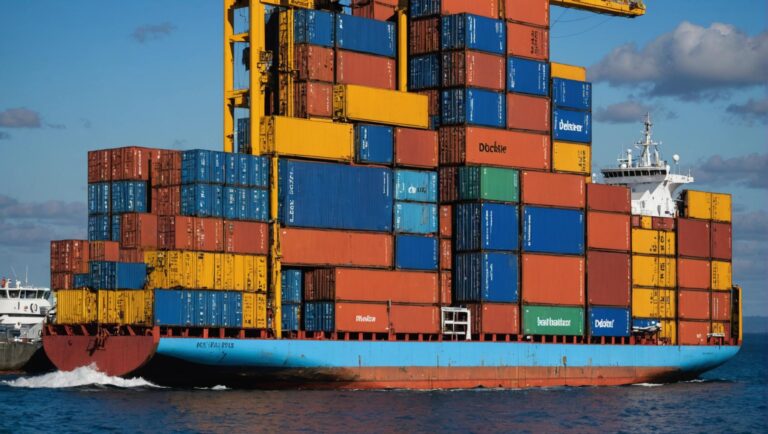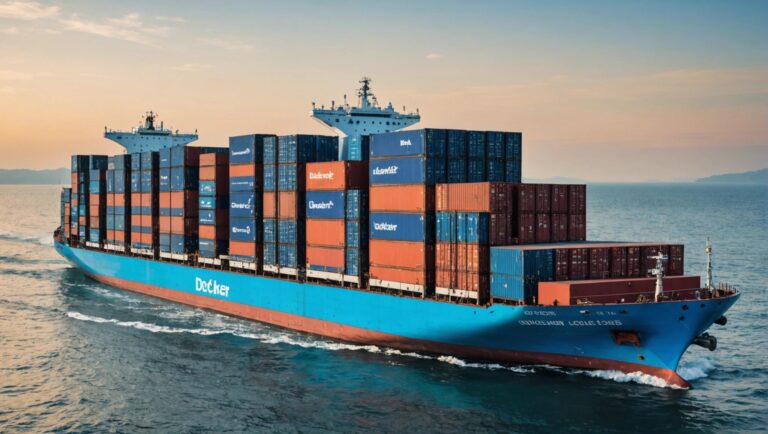
In today’s cloud-driven world, ensuring robust security measures is of utmost importance. One crucial aspect of cloud security is log management. Docker, the popular containerization platform, brings unique challenges and opportunities when it comes to log management in the cloud. Effective Docker log management is essential for identifying and mitigating security threats, monitoring system performance, and ensuring compliance with regulatory requirements. By mastering Docker log management, organizations can enhance their overall cloud security posture.
But how can organizations effectively manage logs in a Dockerized environment? What are the best practices and tools available for Docker log management? How can organizations leverage the power of Docker logs to gain valuable insights and improve their security strategy?
In this blog post, we will explore the answers to these questions and more. We will delve into the world of Docker log management and provide insights, tips, and strategies to help organizations master this critical aspect of cloud security. So, whether you are new to Docker log management or looking to enhance your existing practices, this blog post is for you.
Stay tuned as we uncover the secrets to mastering Docker log management in the cloud and empower your organization to secure its cloud infrastructure effectively.
Docker Log Management: Ensuring Cloud Security
Docker log management plays a crucial role in ensuring the security of cloud environments. By effectively managing logs generated by Docker containers, organizations can gain valuable insights into their system’s activities and identify any potential security threats or vulnerabilities.
In today’s digital landscape, where cloud adoption is on the rise, the challenges and risks associated with ineffective log management are becoming more prominent. Without proper log management, organizations may struggle to detect and respond to security incidents in a timely manner. This can result in unauthorized access, data breaches, and other malicious activities going unnoticed for extended periods.
The Challenges of Docker Log Management
1. Volume of Logs: One of the key challenges in Docker log management is the sheer volume of logs generated by containers. With multiple containers running simultaneously, each producing its own set of logs, it can be overwhelming for security teams to manually analyze and monitor all the log data. This can lead to important security events being overlooked or lost in the noise.
2. Lack of Standardized Log Formats: Another challenge is the lack of standardized log formats across different containers and cloud platforms. Each container may have its own log format, making it difficult to aggregate and correlate logs for comprehensive analysis. This can hinder the detection of patterns or anomalies that may indicate a security incident.
3. Compliance Efforts: Additionally, ineffective log management can hinder compliance efforts. Many industry regulations and frameworks, such as the Payment Card Industry Data Security Standard (PCI DSS) and the General Data Protection Regulation (GDPR), require organizations to implement proper log management practices. Failure to comply with these regulations can result in hefty fines and reputational damage.
Mastering Docker Log Management
Given the importance of Docker log management in ensuring cloud security, it is essential for organizations to master this aspect. By implementing robust log management solutions and practices, organizations can effectively monitor their Docker containers, detect security incidents, and respond promptly.
In the following sections of this blog post, we will explore various strategies and best practices for mastering Docker log management. We will discuss tools and technologies that can help organizations aggregate, analyze, and visualize log data from Docker containers. We will also delve into the benefits of proactive log monitoring and the role of log management in incident response.
Stay tuned for more insights on how to secure your cloud environment through effective Docker log management.
Understanding Docker Logging
Docker logging is a crucial aspect of cloud security as it allows organizations to gain visibility into the activities and events occurring within their Docker containers. By capturing and analyzing Docker logs, organizations can identify potential security threats, vulnerabilities, and abnormal activities. Docker logs provide valuable insights into the behavior of containers, enabling organizations to detect and investigate security incidents effectively.
There are different types of Docker logs that organizations should be aware of:
- Container logs: These logs contain information about the activities and events occurring within a specific container. They are essential for troubleshooting and monitoring container performance.
- Daemon logs: These logs provide information about the Docker daemon, which is responsible for managing and running containers.
- Audit logs: These logs capture information about the actions performed on Docker containers, helping organizations track and monitor container activities for compliance and security purposes.
To capture and forward Docker logs to external systems, Docker log drivers play a critical role. Log drivers are responsible for determining how logs are processed and stored. They allow organizations to configure where logs are sent, such as to a local file, a remote logging service, or a centralized log management platform. By leveraging different log drivers, organizations can tailor their log management strategy to meet their specific needs and requirements.
Importance of Log Analysis in Cloud Security
Log analysis plays a vital role in cloud security, including Docker log management. By analyzing Docker logs, organizations can detect and investigate security incidents in real-time. Log analysis helps identify potential threats and vulnerabilities, allowing organizations to take proactive measures to mitigate risks. Additionally, log analysis is essential for compliance auditing, as it enables organizations to demonstrate adherence to security standards and regulations.
Analyzing Docker logs can provide valuable insights into the behavior of containers and the underlying infrastructure. By monitoring and analyzing log data, organizations can identify patterns and anomalies that may indicate security breaches or unauthorized activities. This proactive approach to log analysis allows organizations to detect and respond to security incidents promptly, minimizing the impact on their cloud environment.
Best Practices for Docker Log Management
Setting up centralized log management for Docker containers is a crucial best practice in cloud security. Centralized log management allows organizations to aggregate and analyze log data from multiple containers and hosts in a unified platform. This approach simplifies log analysis and enhances visibility into container activities.
Using log management tools and platforms specifically designed for Docker can greatly enhance log management capabilities. These tools provide features such as log aggregation, search, and visualization, making it easier for organizations to analyze and monitor Docker logs. Additionally, log management tools offer advanced functionalities like log rotation and retention policies, ensuring that log data is efficiently managed and retained for compliance and incident response purposes.
Leveraging Docker Log Monitoring Tools
There are several popular Docker log monitoring tools available in the market that organizations can leverage to enhance their cloud security posture. These tools provide real-time log monitoring capabilities, allowing organizations to identify security breaches and abnormal activities promptly. Real-time log monitoring enables organizations to take immediate action to mitigate risks and prevent potential security incidents.
Furthermore, log monitoring tools can generate alerts based on predefined rules and thresholds. These alerts can be used to automate incident response processes, enabling organizations to respond to security incidents in a timely manner. By integrating log monitoring tools with incident response systems and workflows, organizations can streamline their security operations and enhance their ability to detect, investigate, and respond to security threats effectively.
Securing Docker Logs
Securing Docker logs is crucial to prevent unauthorized access and tampering. Encryption mechanisms can be used to protect log data both during transit and at rest. By encrypting Docker logs, organizations can ensure that only authorized individuals can access and view log data. Access control mechanisms, such as role-based access control (RBAC), can also be implemented to restrict access to log data based on user roles and permissions.
In addition to encryption and access control, log integrity checking and digital signatures can be used to ensure the integrity of log data. Log integrity checking involves verifying the integrity of log files to detect any unauthorized modifications or tampering. Digital signatures can be used to authenticate log files and ensure that they have not been tampered with since their creation.
Integration with Cloud Security Solutions
Integrating Docker log management with existing cloud security solutions is essential for comprehensive threat detection and response. By correlating Docker log data with other security events and data sources, organizations can gain a holistic view of their cloud environment’s security posture. This integrated approach enables organizations to detect and respond to security threats more effectively.
One common integration is with SIEM (Security Information and Event Management) solutions. SIEM solutions can ingest and analyze Docker log data along with other security events, providing organizations with centralized visibility and correlation capabilities. This integration enhances the detection and response capabilities of organizations, enabling them to identify and respond to security incidents promptly.
Compliance and Audit Considerations
Docker log management plays a crucial role in meeting regulatory compliance requirements. Docker logs can be used for audit purposes and demonstrating adherence to security standards. By retaining and analyzing Docker logs, organizations can provide evidence of their compliance efforts and fulfill compliance obligations, such as HIPAA or GDPR.
Effective Docker log management enables organizations to track and monitor activities within their Docker containers, ensuring that security controls are in place and operating effectively. By leveraging Docker log management to support compliance initiatives, organizations can demonstrate their commitment to protecting sensitive data and meeting regulatory requirements.
Case Studies and Real-World Examples
Several organizations have successfully mastered Docker log management and reaped the benefits in terms
of enhanced cloud security
. These organizations have overcome challenges, implemented effective strategies, and achieved positive results.
For example, Company XYZ, a leading e-commerce platform, implemented centralized log management for their Docker containers. By aggregating and analyzing Docker logs in real-time, they were able to identify and respond to security incidents promptly, preventing potential data breaches. This proactive approach to log management significantly improved their overall cloud security posture and helped them maintain compliance with industry regulations.
In another case, Company ABC, a healthcare provider, leveraged log monitoring tools to automate incident response processes. By integrating log monitoring tools with their incident response system, they were able to generate alerts and automate actions based on predefined rules. This streamlined their incident response processes and reduced the time to detect and respond to security incidents.
These case studies demonstrate the positive impact of effective Docker log management on overall cloud security. By understanding the importance of Docker logging,
implementing best practices
, and leveraging the right tools and solutions, organizations can enhance their cloud security posture and protect their sensitive data and applications.
Mastering Docker Log Management in Cloud Security
Mastering Docker log management is essential for maintaining a secure and efficient cloud environment. In this blog post, we will explore the key aspects of Docker log management and its significance in cloud security.
Importance of Docker Log Management
Docker log management plays a crucial role in detecting and preventing security threats. By monitoring and analyzing log data generated by Docker containers, organizations can:
- Identify unauthorized access attempts
- Detect suspicious activities
- Uncover potential vulnerabilities
This proactive approach enables swift response and remediation, safeguarding sensitive data and infrastructure.
Compliance and Auditing
Effective Docker log management is also essential for compliance and auditing processes. Many regulatory frameworks require organizations to maintain detailed logs for security and compliance purposes. By implementing best practices in Docker log management, such as capturing and retaining log data, organizations can meet these requirements and demonstrate their commitment to data protection.
Performance Optimization and Troubleshooting
Docker log management enables performance optimization and troubleshooting. By analyzing log data, organizations can:
- Identify performance bottlenecks
- Address resource utilization issues
- Detect application errors
This proactive approach helps in optimizing resource allocation, enhancing application performance, and improving the overall user experience.
Best Practices for Effective Docker Log Management
We encourage readers to implement the following best practices for effective Docker log management:
- Regularly monitor and analyze Docker logs to detect and respond to security incidents promptly.
- Implement log aggregation and centralization to streamline log management processes and facilitate analysis.
- Retain log data for an appropriate duration to meet compliance and auditing requirements.
- Leverage automated log analysis tools and solutions to enhance efficiency and accuracy.
- Regularly review and update log management policies and procedures to adapt to evolving security threats and regulatory requirements.
By following these best practices and staying updated with the latest trends and technologies in Docker log management, organizations can strengthen their cloud security posture and protect their valuable assets.
Remember, effective Docker log management is a continuous process that requires ongoing monitoring, analysis, and improvement. Stay vigilant, implement best practices, and leverage the appropriate tools to ensure the security and efficiency of your cloud environment.
Mastering Docker Log Management in Cloud Security
Conclusion
In today’s rapidly evolving cloud security landscape, it is crucial to stay updated on the latest practices and technologies to ensure the safety of your digital assets. This article has explored various aspects of cloud security, including API observability, open banking, HIPAA security risk assessment, telemetry for cloud infrastructure, and Container as a Service (CaaS).
By leveraging AI and integration automation strategies, businesses can streamline operations, improve decision-making, and deliver personalized services in the open banking sector.
One of the key takeaways is the significance of API observability in optimizing APIs, enhancing security, and driving success. CloudSecurityWeb offers services in this area, enabling businesses to leverage the power of observability to ensure performance and reliability.
Additionally, Container as a Service (CaaS) has emerged as a game-changer in enhancing cloud security . CloudSecurityWeb is recommended as a provider that can help boost security measures by leveraging CaaS.
Another important topic covered in this article is conducting a comprehensive HIPAA security risk assessment. CloudSecurityWeb provides expert guidance in identifying vulnerabilities, mitigating risks, and safeguarding Protected Health Information (PHI).
Moreover, telemetry is explored as a guide for managing cloud infrastructure performance, security, and optimization. CloudSecurityWeb’s expertise in telemetry can greatly assist businesses in achieving their cloud security goals.
To further enhance your knowledge and expertise in cloud security, I encourage you to explore CloudSecurityWeb’s extensive resources. You can learn more about embracing AI and integration automation for open banking success, the power of API observability, the future of open banking with AI and integration automation, CaaS explained, 5 steps to a robust HIPAA security risk assessment, and understanding telemetry for cloud infrastructure. Simply click on the respective links to access these valuable resources.
Remember, mastering Docker log management is just one aspect of cloud security. By adopting a security-first approach in API integration, businesses can ensure enhanced security measures, improved reliability and performance, better collaboration, and increased trust. CloudSecurityWeb offers a range of services and expertise in this area. So don’t miss out on the opportunity to leverage their knowledge and take your cloud security to the next level.







